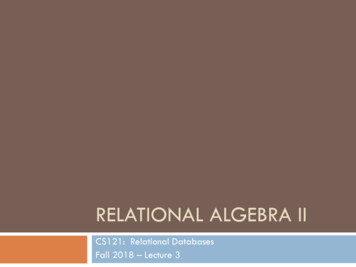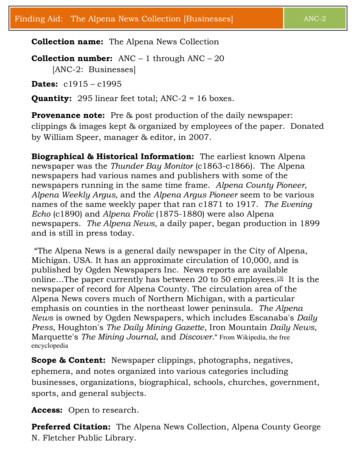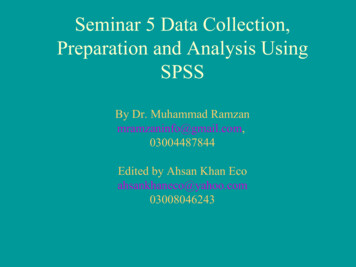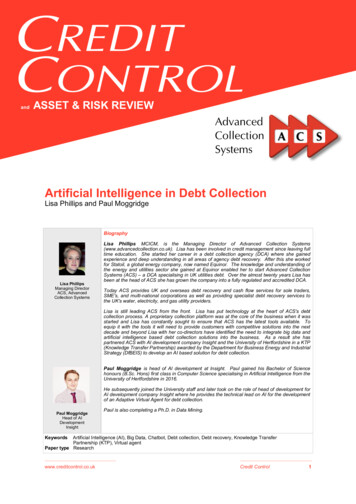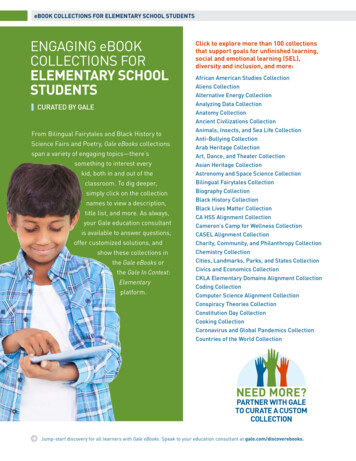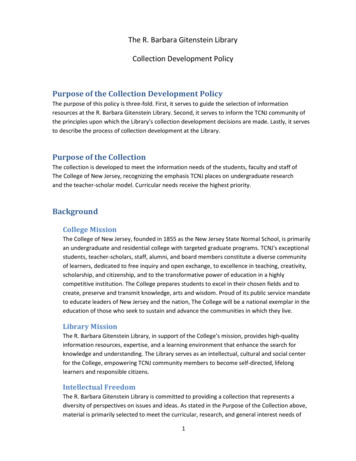
Transcription
The R. Barbara Gitenstein LibraryCollection Development PolicyPurpose of the Collection Development PolicyThe purpose of this policy is three-fold. First, it serves to guide the selection of informationresources at the R. Barbara Gitenstein Library. Second, it serves to inform the TCNJ community ofthe principles upon which the Library’s collection development decisions are made. Lastly, it servesto describe the process of collection development at the Library.Purpose of the CollectionThe collection is developed to meet the information needs of the students, faculty and staff ofThe College of New Jersey, recognizing the emphasis TCNJ places on undergraduate researchand the teacher-scholar model. Curricular needs receive the highest priority.BackgroundCollege MissionThe College of New Jersey, founded in 1855 as the New Jersey State Normal School, is primarilyan undergraduate and residential college with targeted graduate programs. TCNJ's exceptionalstudents, teacher-scholars, staff, alumni, and board members constitute a diverse communityof learners, dedicated to free inquiry and open exchange, to excellence in teaching, creativity,scholarship, and citizenship, and to the transformative power of education in a highlycompetitive institution. The College prepares students to excel in their chosen fields and tocreate, preserve and transmit knowledge, arts and wisdom. Proud of its public service mandateto educate leaders of New Jersey and the nation, The College will be a national exemplar in theeducation of those who seek to sustain and advance the communities in which they live.Library MissionThe R. Barbara Gitenstein Library, in support of the College’s mission, provides high-qualityinformation resources, expertise, and a learning environment that enhance the search forknowledge and understanding. The Library serves as an intellectual, cultural and social centerfor the College, empowering TCNJ community members to become self-directed, lifelonglearners and responsible citizens.Intellectual FreedomThe R. Barbara Gitenstein Library is committed to providing a collection that represents adiversity of perspectives on issues and ideas. As stated in the Purpose of the Collection above,material is primarily selected to meet the curricular, research, and general interest needs of1
the College community. The Library adheres to the principles of intellectual freedom asoutlined in the Library’s Core Beliefs and the Library Bill of Rights of the American LibraryAssociation. Article 1 of the Library Bill of Rights states "Books and other library resourcesshould be provided for the interest, information, and enlightenment of all people of thecommunity the library serves. Materials should not be excluded because of the origin,background, or views of those contributing to their creation." Article 2 continues, "Librariesshould provide materials and information presenting all points of view on current andhistorical issues. Materials should not be proscribed or removed because of partisan ordoctrinal disapproval."Challenges to inclusion of specific items in the Library’s collection will be addressed by theDean of the Library.ResponsibilityThe R. Barbara Gitenstein Library operates within the principles of shared governance in place atTCNJ. To safeguard the principles of intellectual freedom from which the Library derives its strengthand credibility, the authority to build and maintain the Library’s collection rests with the Libraryfaculty. The Library solicits input from campus stakeholders regarding collection development.Roles and responsibilities related to collection development are discussed below.DeanThe Dean of the Library is ultimately responsible for the development and implementation ofthe Collection Development Policy. Working with the Collection Development Committee(“CDC”), the Dean ensures that the Policy is in alignment with the College’s and Library’sstrategic plans. Based on CDC recommendations, the Dean seeks to secure the resourcesneeded to support the collection.The Dean responds to any challenges on the inclusion or exclusion of specific items in theLibrary’s collections. The Dean is also ultimately responsible for the distribution of collectiondevelopment responsibilities among the librarians.Collection Development CoordinatorThe Assistant Director for Public Services serves as the CD Coordinator and is responsible forthe effective implementation of the Collection Development Policy. In consultation with theDean and the CDC, the CD Coordinator oversees the allocation and expenditure of the CDbudget.Collection Development CommitteeThe Collection Development Committee consists of seven library faculty members: the AssistantDirector for Public Services, the Acquisitions Librarian, and the Electronic Resources/SerialsLibrarian serve ex officio; four subject librarians are elected by the library faculty to staggeredtwo-year terms. A chair will be elected annually by the committee.2
The CDC responsibilities include: ongoing review and revision of the Collection DevelopmentPolicy and its associated procedures; developing and maintaining a collection budget allocationmodel; reviewing and providing input on proposed acquisitions allocations; serving as thedecision-making body for the final selection of resources with continuing costs; and serving asthe decision-making body for higher-priced resources, even if those resources do not incurcontinuing costs.Subject LibrariansSubject Librarians are responsible for multiple aspects of collection development. They areresponsible for the selection and recommendation of library resources within their subjectareas, ensuring the effective expenditure of the allocations in their areas. They are alsoresponsible for assessment of the strengths and weaknesses of those areas. With regard tothe Collection Development Policy itself, they are responsible for the creation andmaintenance of the Subject Collection Development Statements for their respective subjects.Lastly, they are responsible for maintaining open channels of communication with academicdepartments or programs in their subject areas.FacultyFaculty in academic departments or programs share responsibility for collection development.Each department or program designates a Library Liaison, either appointed from among thefaculty by the department chair or program coordinator or elected by the faculty from amongtheir ranks. Responsibilities of the Library Liaison include coordination of recommendationsgenerated by faculty members, conveying issues of departmental interest and concern to theSubject Librarian, and dissemination of information from the Subject Librarian that may berelevant to all department or program faculty. All faculty members are responsible forrecommending library resources in their subject area as well as for bringing issues of concern tothe attention of their Library Liaison or their Subject Librarian. The Liaison ensures thatrecommendations and concerns are representative of departmental priorities.What We CollectGeneral Guidelines for Selecting MaterialsSelection PrioritiesThe selection of materials is an ongoing process affected by the content and needs of achanging curriculum. These guidelines for selection apply equally to all types and formats ofmaterials considered for acquisition. Library funds are used for current and limitedretrospective purchases to build a balanced collection that supports the academic mission ofTCNJ. Given the College’s resources, it is not always possible to provide all the materials thatmay be necessary or desirable. Therefore, in selecting materials, the following priorities(listed in descending order) apply:3
materials supporting the curriculumessential reference toolsmaterials supporting student researchmaterials contributing to a balanced collectionmaterials to support research needs of faculty, with careful consideration of potentialusefulness to studentsmaterials supporting cultural and general informational materialsmaterials for recreational purposes, such as a popular reading collection, (coverage in thisarea is limited)Selection CriteriaDetailed guidelines for selection are provided in the types and formats sections and the profilesbased on the subject template presented in the appendix. The following factors should beconsidered in selecting and adding materials to the collection of the Library:Subject matter and scope:relevant to the curriculumsignificant; has lasting valuerelationship to current holdings and strength of materials in that subject areahistorical valueresearch value to students and facultydemand and frequency of interlibrary loan requests in the same or similar subjectslocal interest (subject, author or publisher)Treatment of subject or material:can be introductory, speculative, scholarly, technical, or popularmay be current or retrospectivemay be of timely and/or popular interestshould be suitable and useful in subject, level, and style for intended audiencemay be important as a document of the timesValidity/Accuracy:information presented is accurate, current, and authoritativeauthor, artist, or publisher has good qualifications or reputationsubject specific and standard library reviewing sources aid in making selectiondecisionsother criteria to consider include availability of indexing, date of publication,primary versus secondary source, fact or opinion, observation or researchPoint of view:fair and balanced in its point of view, but titles of a partisan or sectarian nature,even some that may have a biased point of view, may be selectedcontributes to community values and citizenshipalternative points of viewsocial significanceElements of quality:well written4
suitable format for messageoriginality and creativity in presentation and contentcited frequently in standard bibliographiesCollection Development for Persons with DisabilitiesUnder the Americans with Disabilities Act and related acts, persons with disabilities have equalaccess to information and sources to the extent possible within the mission guidelines of the R.Barbara Gitenstein Library. All library information services, including access to electronicinformation, should be accessible to users regardless of disabilities. Assistive technologyequipment and/or software are available in the Library for users needing to adapt printedmaterials and electronic resources in order to use them.Media playback equipment in the Library has closed captioning capabilities, and the librarypurchases videos with closed captions or subtitles when they are available.Types of Materials CollectedMonographsMonographs are collected using the General Guidelines for Selecting Materials above, thedetailed Monograph and Format guidelines below, and applicable Subject Statements.TextbooksTextbooks used for courses at TCNJ are not normally collected. Non-assigned textbooks,undergraduate level or above, may be acquired if they otherwise meet selection criteria andenhance the collection as a whole. A collection of textbooks published for preschool throughhigh school levels is maintained to support the education curriculum.ThesesCopies of masters theses completed at TCNJ are collected for both preservation and researchpurposes. Theses and dissertations from other institutions may be acquired if they otherwisemeet selection criteria and enhance the collection as a whole.Serials and DatabasesJournals, newspapers, and other serials are collected using the General Guidelines for SelectingMaterials above, the Serials and Format guidelines below, and applicable Subject Statements.Because these materials incur continuing financial obligations, they necessitate more deliberateconsideration than most materials.Formats of Materials CollectedPrintThe R. Barbara Gitenstein Library acquires materials in print when that is the most appropriate,available format.ElectronicThe R. Barbara Gitenstein Library purchases or licenses resources in electronic form using theguidelines in the Electronic Resources section, below.5
Audiovisual RecordingsThe R. Barbara Gitenstein Library purchases or licenses audio and audiovisual recordings using theguidelines in the Media section and, when applicable, in the Electronic Resources section, below.MicroformsThe R. Barbara Gitenstein Library acquires microform resources on a limited basis, primarilyfor serials as described in the Serials section, below. Occasionally, significant collections ofmaterials critical to support curricular needs but either unavailable in print or electronicform, or difficult to acquire and maintain in print or electronic form, will be considered forpurchase as microforms.Types and Formats of Materials Not CollectedThe R. Barbara Gitenstein Library does not systematically collect the following types or formats ofmaterials:formats not compatible with existing and/or anticipated Library hardwaremapstextbooks currently in use for TCNJ coursesDetailed Guidelines for Selecting MaterialsSerialsScopeA serial is a publication issued in successive parts bearing numerical orchronological designations and intended to be continued indefinitely. Included inthis definition are scholarly and professional journals, trade publications,newspapers, general interest periodicals, indexes and abstracts, loose leafservices, etc. The collection encompasses paper, electronic and microformformats. Additional considerations for electronic subscriptions are available in theElectronic Resources Policy.Serials represent an ongoing commitment on the part of the R. Barbara GitensteinLibrary. They are costly to purchase, process, store, and maintain. The cost of serialshas dramatically increased in recent decades and continues to rise, so the Library mustbe judicious in adding serials. Careful consideration is important when making arequest for a new subscription, or when reviewing current holdings.Selection ResponsibilitySelection decisions rest with the Collection Development Committee. DepartmentalLiaisons, other TCNJ Librarians and users may offer recommendations to theappropriate Subject Librarians. Questions relating to price and availability should bedirected to the Electronic Resources/Serials Librarian.6
Selection Priorities and CriteriaSubject Librarians and the Collection Development Committee consider the followingcriteria and priorities when recommending or selecting a new serial title or transferring asubscription from print to electronic format or from one electronic version to another (seealso Electronic Journals: Selection Criteria):titles critical for the ongoing support of current curriculum, includingundergraduate research, receive first prioritytitles in support of a new area of focus that an academic department or program and theCollege Administration intend to continue supporting receive high prioritytitles likely to be used by more than one department receive strongconsiderationtitles recommended by accrediting agencies receive strong considerationtitles that exclusively support individual faculty research are given low priority (TheLibrary serves the research needs of faculty through interlibrary loan,commercial document delivery, and providing either direct borrowing oraccess privileges for onsite use of other collections in the area.)titles frequently requested through Interlibrary Loan or document delivery over anumber of years (These requests are indicators of the degree of demandfor titles not owned.)titles of a recreational, cultural, or broad informational nature are not excluded(The Library is committed to meet general interest needs where possible.)title cost (not given undue weight unless it exceeds the average cost of a journal inits field)titles indexed or abstracted in one or more of the databases, indexing, orabstracting services available through the Library (These are given morefavorable consideration since these titles will be more accessible and moreapt to be used by TCNJ community.)titles of high intrinsic quality (as demonstrated by the following indicators)receive more favorable consideration:reputation of editors, contributors, publishers, reviewsjournal ranking studiesquality of production, e.g., paper, typeface, graphics, special features,online interfacecurrency and regular publication of issuesFormat (electronic, print, or microform)In principle, electronic subscriptions to journals and newspapers will be preferred over printwhen access, usability, licensing and cost considerations are resolved satisfactorily. Reasonsfor this preference include broad and immediate access, support of users in remotelocations or during the hours when the Library is closed, simultaneous availability of a singlearticle to multiple users, ease of integration into electronic reserves, simpler copyrightcompliance for electronic reserves, the availability of usage statistics, cost savings forshelving and binding, and a general user preference for online access. (See ElectronicResources Policy)7
In general, print will still be favored for:titles with significant cost increases for online accesstitles for which the quality of online graphics is not high enough to support itsprimary usestitles with limited assurance of perpetual accesstitles with license conditions that would restrict the usefulness of the title - e.g.,provisions restricting use in electronic reservescore journals where ease of use and dissemination (e.g., browsing) are better thane-formatpopular magazinesPrint Electronic may be selected if:the cost of print includes onlineelectronic access is available only to print subscribers (Titles with rolling back files willonly have online access implemented when there is substantial content)electronic content coverage is not identical to that of the print version, or the textor illustration format of the print and electronic versions is not of the same qualityprint versions are needed to enable accurate references to an official orauthoritative version (including those recognized in court hearings)electronic publication significantly lags behind the print editionthe publisher has no commitment to archiving the electronic versionMicroform is the least preferred format, but is selected when there is no perpetualelectronic access, or limited assurance of access, and:the cost of binding and/or storing is prohibitiveimage quality is acceptable to support the primary uses of the titlethe format of the material does not lend itself to binding (e.g. newspapers)Requesting a New SubscriptionRecommendations for new serials subscriptions, with a short explanation as to why theyshould be acquired (particularly how they support the curriculum), should be submitted tothe Electronic Resources/Serials Librarian or the appropriate Subject Librarian at the R.Barbara Gitenstein Library. Complete bibliographic information, publisher's advertisements,reviews of the periodical, and indexing and abstracting coverage, are all appreciated. TheCollection Development Committee reviews all requests. Recommendations for newsubscriptions are accepted at any time, although the CDC will review subscription requeststwice per year. If the recommendation is approved, the new subscription may begin with thefirst issue of the next volume but may not begin until the start of the next fiscal year.The CDC will determine if back issues should be added to the collection.8
Evaluation and CancellationBefore renewing for a second year, Subject Librarians will routinely evaluate new titles;departmental liaisons will be asked to help in this evaluation. Departments may also beasked to help in evaluating serial holdings in various subject areas at regular intervals.Recommendations for cancellation are accepted at any time, although actual cancellationtypically occurs at the end of the subscription cycle. The Collection DevelopmentCommittee will be responsible for the evaluation and cancellation of general interest serials.In addition to criteria used for selection, the following factors will be considered inevaluating journals:Relevanceextent to which the title continues to support TCNJ curriculausage data, if availablechanges to lists of journals recommended by accrediting agencieschanges in focus of publicationCostcurrent price and price historycost effectivenessQualitychanges in intrinsic quality of publicationMonographsScopeFor the purposes of this document, a monograph is defined as any non-serial item (i.e., anitem either complete in one part or complete, or intended to be completed, in a finitenumber of separate parts). Included in this definition are books, reference works, musicalscores, films, etc. Monographs may be considered for selection in any suitable formatcollected by the Library.AccessBibliographic and holdings records, including associated hypertext links for monographs inelectronic formats, are added to the Library’s catalog. Additional access considerations fornon-print titles are addressed in the Electronic Resources and Media sections of thisdocument.Selection ResponsibilityContent selection decisions rest with Subject Librarians. All faculty members are responsiblefor recommending Library resources in their subject area. Departmental Liaisons, other TCNJLibrarians, and users may offer recommendations to the appropriate Subject Librarian.9
While final selection decisions rest with the Subject Librarian for most monograph selections,some materials may require further consideration before being acquired, as outlined inapplicable sections of this document. These include reference materials, e-books, and audiovisual recordings.Selection CriteriaMonographs are selected using the General Selection Guidelines above and the detailed,applicable Subject Profiles and material-type or format policies below.DuplicationThe R. Barbara Gitenstein Library normally purchases only one copy of a title but mayprovide both print and electronic access to particular monograph titles if this is justified bydemand or preservation requirements.Electronic ResourcesIntroductionThe policy for collecting and providing access to electronic resources addresses specificissues that relate to the electronic format. It is divided into three sections:Electronic JournalsElectronic BooksOther Electronic ResourcesThe principles contained in the general and subject specific sections of the R. BarbaraGitenstein Library Collection Development Policy apply equally to electronic resources. Aswith other materials, subject librarians assess present curriculum and research needs,select materials that meet the Library's standards in regard to quality, comprehensiveness,and authoritativeness, and weigh the purchase of a particular resource against otherpossible acquisitions from materials budgets. Issues of accessibility for users with differingabilities will also be taken into consideration.The R. Barbara Gitenstein Library negotiates vendor/publisher licensing agreements forelectronic resources using VALE Preferred Licensing Terms whenever possible. The Librarywill take all reasonable steps to comply with licenses and to inform its users of relevantlicensing restrictions. Authorized users for on-campus access shall be defined as all currentfaculty, students and staff of The College of New Jersey, as well as walk-in users physicallypresent in the Library unless restricted by licensing terms. Remote access will be extended toall authorized users defined above except walk-in users. The Library will ensure that remoteaccess is restricted to only appropriate authorized users by implementing an authenticationprocess such as a proxy server or virtual private network.The rapidly evolving nature of electronic formats will necessitate regular review of thispolicy.10
Electronic JournalsScopeThis policy addresses the selection, acquisition and delivery of electronic journalsincluding:single-title electronic-only subscriptionsmulti-title electronic packages ordered from publisherselectronic versions bundled with print subscriptions (i.e., where electronic fulltext is available only to print subscribers)aggregate products from information providers such as EBSCO, Gale, orProQuest (The Library has no control over the content of these collections.)free access (These are not always cataloged, and in some cases may be linkedonly from library web pages.)AccessThe R. Barbara Gitenstein Library maximizes access to e-journals by several means:bibliographic and holdings records and associated hypertext links are added tothe Library’s catalog for all e-journals in the first three categories abovecataloged e-journals, as well as those in the remaining two categories, are alsolisted by title using the Library’s electronic resource access management systemsupport and training to optimize useSelection ResponsibilitySelection decisions rest with the Collection Development Committee. DepartmentalLiaisons, other TCNJ Librarians and users may offer recommendations to the appropriateSubject Librarians. Questions relating to price and availability should be directed to theElectronic Resources/Serials Librarian. A decision to convert from print to electronicformat that would result in no change in cost or reduced cost can be made by theappropriate Subject Librarian(s) in conjunction with the Electronic Resources/SerialsLibrarian without going to the Collection Development Committee. (See also Serials:Selection Priorities and Criteria).Selection CriteriaSubject Librarians and the Collection Development Committee will consider thefollowing criteria when recommending or selecting a new electronic-only title ortransferring a subscription from print to electronic format or from one electronicversion to another:coverage and the timely availability of materialenhanced contents and additional functionality of electronic as compared withprint11
convenience for users, e.g., unrestricted access in terms of location and timereliability of accessfull-text availability in PDF or other commonly used electronic formatcost-effectiveness, e.g., subscription savings, lower handling and overheadcosts, number of simultaneous users included in license termsguaranteed access to a complete file of titles for the years of the subscriptionpublisher commitment to maintaining web access to a permanent archive ofback-issuesavailability of usage statistics to support evidence-based decisions on future titleadditions or deletionsavailability of IP authenticationuse of licensed content to fill interlibrary loan requestsDuplicationThe R. Barbara Gitenstein Library will only consider providing both print and electronicaccess to a journal under certain circumstances. See the discussion of Format in theSerials section above.If a print subscription is exchanged for an electronic version and it is found that thecontent coverage, and/or text and illustration format of a particular article, or articles, inthe electronic version, differs from the printed version of the journal, then the Librarywill bear the total cost of obtaining a full and accurate copy of the printed version of thearticle or articles.In cases where the electronic version of a cancelled print title ceases to be accessible,the Library will consider resuming the print subscription and purchasing back issues ifwarranted.Electronic Books, Etc.ScopeThis policy addresses the selection, acquisition and delivery of electronic books or othernon-serial electronic resources, such as government documents, research reports,websites, image files, etc.These include:individual or collections of electronic-only books, etc., ordered direct from thepublisher or through a vendorelectronic versions available with print purchaseselectronic books, etc., available freely on the web (These are not alwayscataloged, and in some cases may be linked only from library web pages.)12
AccessThe R. Barbara Gitenstein Library maximizes access to electronic books, etc., by severalmeans:bibliographic records and associated hypertext links added to the Library’scatalogloading and maintaining necessary software within the Libraryproviding access to applications for TCNJ members to download and installsupport and training to optimize useSelection ResponsibilityContent selection decisions rest with Subject Librarians. Platform selection decisionsrest with the Collection Development Committee (see Selection Criteria under “OtherElectronic Resources with Continuing Costs”). Departmental Liaisons, other TCNJLibrarians, and users may offer recommendations to the appropriate Subject Librarian.Questions relating to price, availability, or platforms should be directed to theAcquisitions Librarian.Selection CriteriaSubject Librarians will consider the following criteria when selecting an electronic title,whether new or the equivalent of an existing print title in the collection:demand (priority being given to anticipated high-demand and reference-typematerial)suitability to curricular supportcurrency and comprehensivenesscost, e.g., handling and overhead costs, number of simultaneous users included inlicense termsenhanced contents and additional functionality, e.g., searchability, annotatabilityease of use and convenience for users, e.g., unrestricted access in terms oflocation and timereliable, stable and permanent accessappropriateness of format, e.g., file size, supported applicationsavailability of usage statistics to support evidence-based decisions on future titleadditions or deletionsavailability of content on the Library’s preferred platformsDuplicationThe R. Barbara Gitenstein Library may provide both print and electronic access toparticular monograph titles if this is justified by demand or preservation requirements.Other Electronic Resources with Continuing CostsScopeOther electronic resources that incur continuing access costs may include indexing and13
abstracting databases, e-book platforms, etc.AccessPurchased or licensed resources and those produced by TCNJ will be given priority forthe inclusion of bibliographic records in the Librar
an undergraduate and residential college with targeted graduate programs. TCNJ's exceptional students, teacher-scholars, staff, alumni, and board members constitute a diverse community . Copies of masters theses completed at TCNJ are collected for both preservation and research purposes. Theses and dissertations from other institutions may be .






